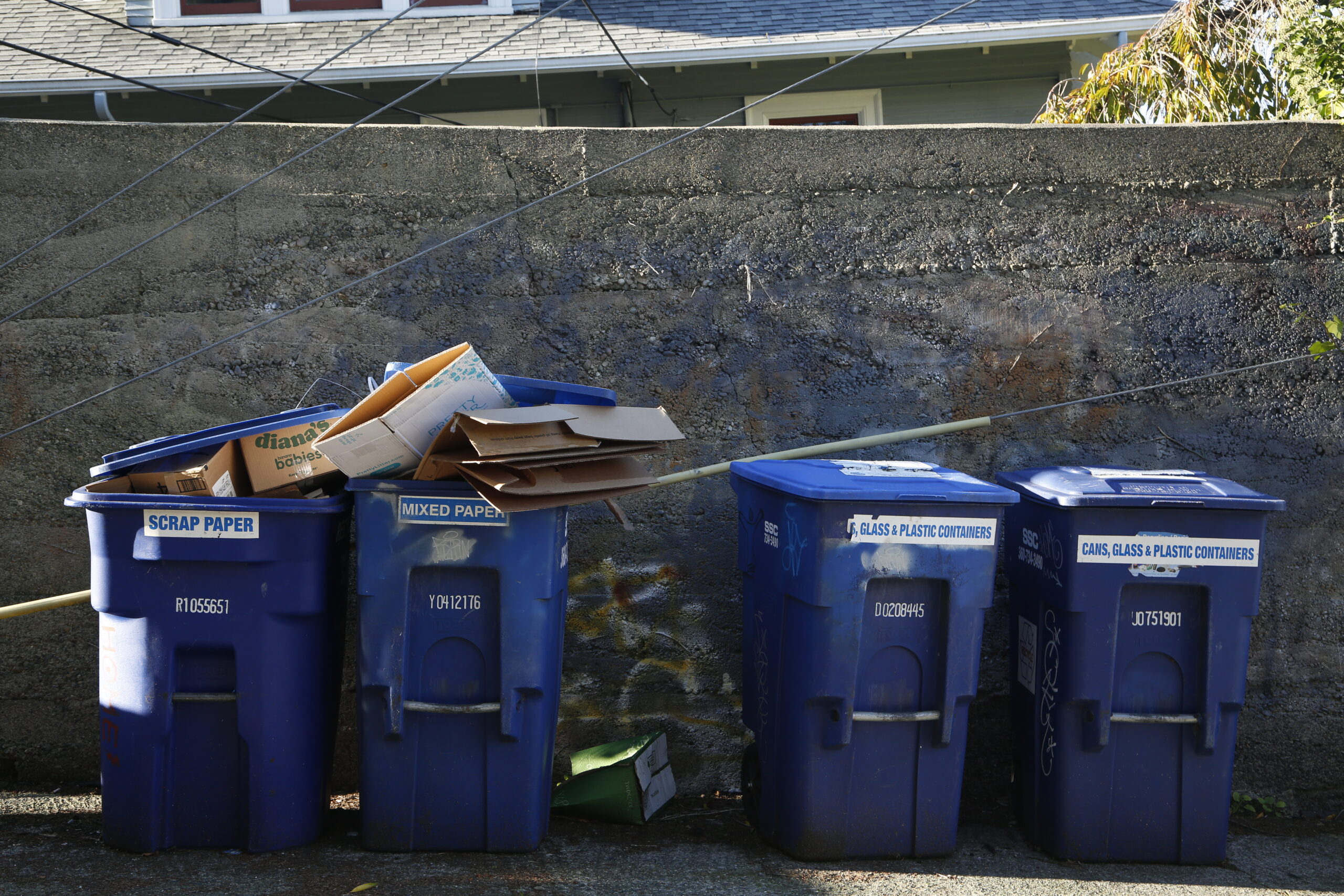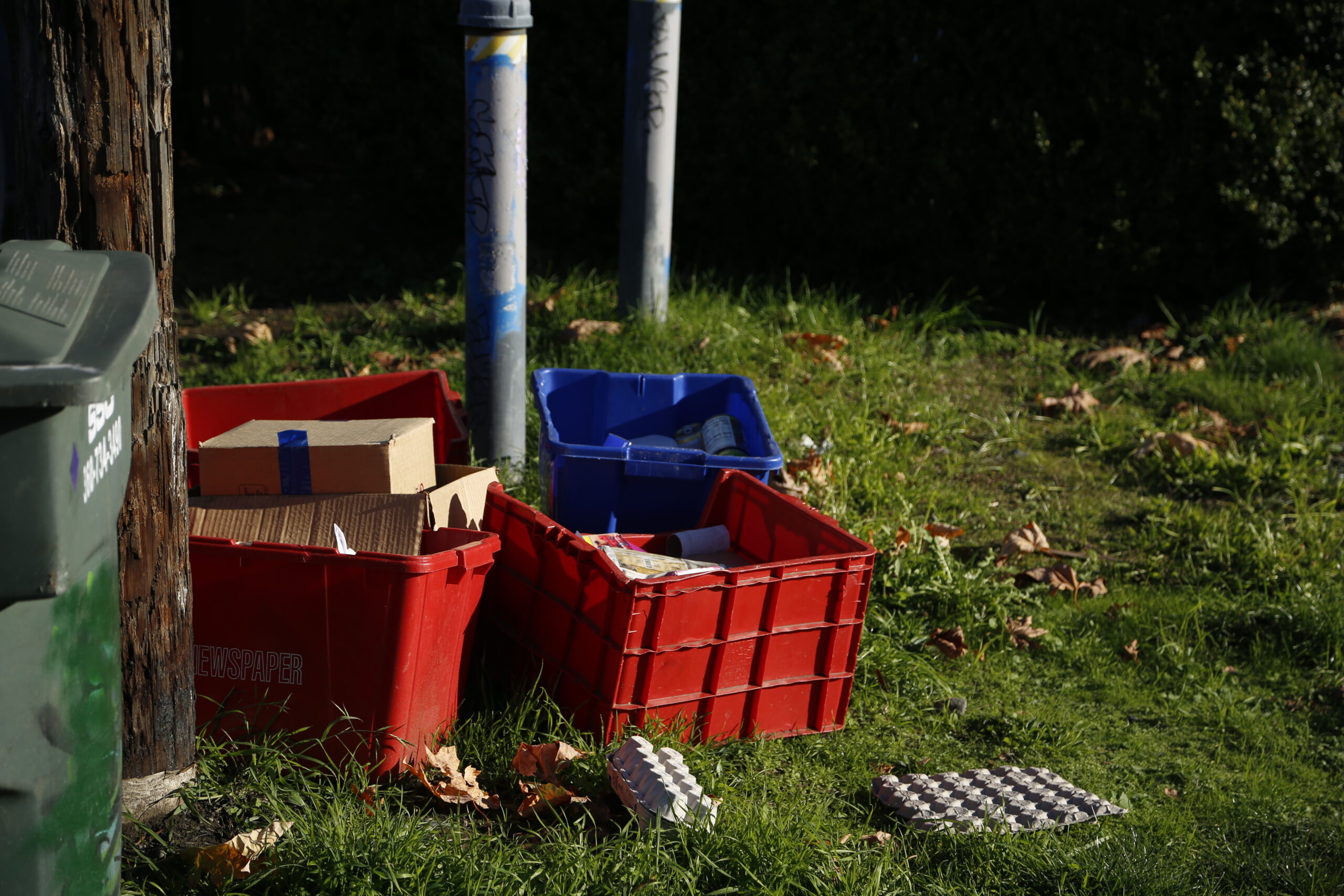by Tori Lehman
This story originally appeared in the Fall 2023 issue of The Planet, a WWU student publication dedicated to environmental awareness and advocacy through responsible journalism.
Say goodbye to the colorful bins lining Bellingham’s neighborhood roads. Bellingham City Council approved the switch to single-stream recycling for all non-commercial locations due to ever-increasing costs of recycling.
While the change, slowing rolling out throughout the city, will come at no cost to residents, the same might not be true for the environment, leaving some looking further upstream to stop the tide of trash.
As costs for processing recycling rise across the country, and facilities remain understaffed, the City of Bellingham has had to reconsider how it processes its trash. Currently, Bellingham uses source-separated recycling, where residents are responsible for separating their own trash into paper, plastics, cardboard, cans, glass, as well as the waste destined for the landfill.
After the Change
After this change, residents will deposit all recyclables into a 90-gallon bin. The remaining trash will go into a separate trash bin.
Single-stream collection can help increase participation rates, but often leaves cardboard soaked from recycled soda cans and plastics sprinkled with broken glass, negating their recyclability.
While concerns for the environmental impacts of this change rise, another fear grows with it: is recycling even worth it?

A line of four recycling bins on North Garden Street in Bellingham. These bins will be switched out with one single-stream recycling bin.
The sounds of garbage trucks are easily recognizable as they meander down alleyways and roadsides. The recycling truck chugs along, then shuts down as it comes to a stop in front of a home. Bins are collected and dumped, and the truck rumbles to life again. Exhaust emits from the tailpipe.
These trucks make hundreds of stops a day at individual houses so workers can manually dump each bin.
“That is pretty labor intensive, that kind of separation,” said Steven Berry, a former Sanitary Service Company garbage truck driver. He estimates that during his 26 years of trash collection, he’s lifted the weight of an aircraft carrier into his truck for disposal.
Eliminating Hard Labor
Single-stream recycling would eliminate this hard labor, streamlining the collection process and allowing workers to stay inside the truck while using an automated arm to pick up bins.
“You can get a packer truck that could take up to 25 tons [of garbage],” said Berry. “It loads really fast, you watch them go down the street with the side arm … But, as far as the quality, that’s another question.”
Single-stream recycling results in a 12.2 percent decrease in net tons recycled when compared to source-separated recycling, according to Container Recycling Institute, a recycling education nonprofit. This decreased tonnage means less product can be repurposed.
“The goal is to keep our recyclables in really good shape, because they are right now with the three-bin system, and we want to maintain that,” said Jennifer Hayden, the solid waste supervisor at Whatcom County Health and Community Services.
If our recyclables are in good shape, why fix what isn’t broken? The change comes not from an environmental standpoint, but a financial one. Previously, America would export about 1.4 million tons of waste overseas.

Currently recyclables are sorted by residents into separate bins, but eventually all recycling will move to one bin and single-stream collection.
China Banned Waste Importing
That changed in 2017 when China, the largest importer of American waste, banned most waste importing due to concerns over pollution and environmental damage. While the United States still exports its waste to other countries like Malaysia and Vietnam, they don’t accept nearly as much as China did.
“The places that we used to send stuff basically told us, ‘We don’t want your stuff anymore,’” said Hayden.
With both recycling systems, a sizable portion of what residents believe they are recycling does not get repurposed. Plastic bottles, for example, are often the worst offenders with roughly a third of bottle material intended for recycling getting sent to landfills, according to Beyond Plastics, a national waste-elimination project based in Vermont.
“I wish I had some sort of tool so I could just completely measure the carbon impact of moving from source-separated to single-stream, but that does not exist,” said Hayden.
All this hair-splitting over methodology makes some residents wonder why we aren’t doing more to stem how much we produce.
“Our mantra back in 1989 still was reduce, reuse, recycle. Recycle is the third alternative,” said Steven Berry.
Recycling was not created with the intent of eliminating waste, only collecting it. As the burden of funding recycling programs falls on cities and towns, the environmental impacts get sidelined to prioritize affordability.
Berry Sponsors Bill
Washington State House Rep. Liz Berry, D-Seattle has sponsored a bill hoping to ease that burden.
“My bill is going to have the producers funding the collection system in your community, so every single doorstep that has garbage pickup is going to have free recycling pickup,” said Berry.
She is working on a bill to require producers to take responsibility for the waste they create.
It’s based on a previous extended producer responsibility (EPR) House bill, which mandates producers’ involvement in waste management and enforces recyclability in products.
EPRs are a way to tackle the larger recycling problem America is facing. Instead of prioritizing the financial outcome of recycling, the focus can shift to the environmental benefit as the financial burden is put on producers.
“People don’t necessarily associate recycling with climate change, but it’s absolutely directly linked,” Berry said.
Producers Become Responsible, in Theory
Not only would producers be required to financially support recycling programs throughout Washington state, removing the weight from municipalities, it would require producers’ products to contain at least 30 percent recycled material. The bill will also make recycling easier for consumers, as more products will be recyclable as well as what’s allowed in recycling bins, adding consistency across the state of Washington.
“This is a problem that has been created by the producers of products,” said Berry. “Consumers don’t call Coca-Cola and say, ‘I want you to make single-use plastic bottles that’s really hard to recycle.’”
Bills like these are large undertakings and will likely be broken up into smaller bills that are easier to pass. Often, they are diverted to committees which hold public meetings that citizens can attend to show support.
Calling your local representative is another way to promote bills. Hearing support from citizens helps motivate representatives like Liz Berry to keep fighting against pollution.
EPRs implemented in places like Europe and Canada have already seen benefits from the programs. The Organization for Economic Cooperation and Development’s study of France’s EPR laws found that while they aren’t a “silver bullet to address waste management,” these adaptable laws are a big step in the right direction.
“When we talk about sustainability, it’s in the goods that we produce,” said state Sen. Joe Nguyên, D-White Center, a co-sponsor of the Washington Recycling and Packaging act, the companion Senate bill to the House bill Berry is redesigning.
Bickering Won’t Reduce Waste
It’s easy to get hung up on the details of individual environmental responsibility. But bickering over the nitty-gritty of recycling won’t reduce waste, not when companies such as Starbucks created approximately 265 million pounds of landfill garbage in 2018.
“I’m less worried about an individual’s carbon footprint than I am about corporations’ carbon footprints, because they really have the ability to dictate what happens for us,” said Nguyên.
As Bellingham and portions of Whatcom County transition to a new style of recycling, education on the new program is important to help residents keep up the good work they’ve been doing.
But this change should be a reminder to hold not only ourselves accountable, but corporations as well. To create a truly circular economy, one that eliminates overproduction and promotes sustainably, individuals’ habits can’t be the focus of environmental efforts.
“We’re just getting the tip of the iceberg on this,” said Berry. “We have to have less packaging waste, and we have to make sure the packing waste we do produce is being responsibly recycled.”
_______________________
Tori Lehman, a second-year journalism student at Western Washington University, is using her reporting in an attempt to bridge the gap between the environment and those who live in it.
Sources used to inform this article
1. https://www.sciencedirect.com/science/article/abs/pii/S0921344912001449. “Greenhouse gas impact of dual stream and single stream collection and separation of recyclables. Study on the emissions from both forms of collection,” Resources, Conservation and Recycling, December 2012.
2. https://www.sciencedirect.com/science/article/abs/pii/S0301479723013920?via%253Dihub. “U.S. plastic waste exports: A state-by-state analysis pre- and post-China import ban. Study on where our plastic waste goes before and after China’s blue sky policy banned waste export,” Journal of Environmental Management, 15 October 2023.
3. https://www.mdpi.com/2079-9276/4/2/384. “A comparison of single and multi-stream recycling systems in Ontario, Canada.” Resources 2015, 17 June 2015.
4. https://meetings.cob.org/Meetings/ViewMeeting?id=2871&doctype=1. City of Bellingham public works and natural resources committee meeting. Official recording of the city council meeting deciding to switch to single-stream recycling, February 2023.
5. https://recyclingpartnership.org/the-recycling-partnerships-impact-report-2022/. The Recycling Partnership’s report on their influence and impact on national recycling, 2022.
6. Evaluation of EPR Programmes. The Organization for Economic Cooperation and Development’s evaluation of EPRs effects on recycling quality and the economy of Canada, Germany, The Netherlands, Japan, and Britain, August 2004.
7. https://www.container-recycling.org/assets/pdfs/reports/2009-SingleStream.pdf. Understanding economic and environmental impacts of single-stream collection systems. Container Recycling Institute’s report on single-stream’s cost and quality impacts compared to other forms of recycling, December 2009.
8. https://www.lastbeachcleanup.org/_files/ugd/dba7d7_9450ed6b848d4db098de1090df1f9e99.pdf. The real truth about the U.S. plastics recycling rate. Beyond Plastic’s report on U.S. plastic recycling rates, May 2022.
9. https://read.oecd-ilibrary.org/environment/extended-producer-responsibility/20-years-of-epr-in-france-achievements-lessons-learned-and-challenges-ahead_9789264256385-15-en#page1. OECD: Extended Producer Responsibility: Updated Guidance for Efficient Waste Management — “20 years of EPR in France: Achievements, lessons learned and challenges ahead.”The Organization for Economic Cooperation’s analysis of European, and more specifically French, EPR laws and their impacts after 20 years of implementation, September 2016.
10. https://stories.starbucks.com/uploads/2020/01/Starbucks-Environmental-Baseline-Report-2.pdf. Starbuck’s 2018 report conducted by Quantis and in partnership with the World Wildlife Fund.




























